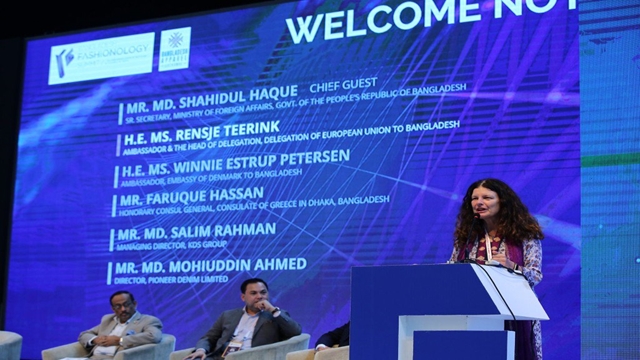FT Online
Published:2019-05-04 22:43:47 BdST
EU: Bangladesh has to move to environment-friendly production process
Rensje Teerink, EU ambassador to Bangladesh, addresses the second edition of the Bangladesh Fashionology Summit held at International Convention City Bashundhara in Dhaka on Thursday
However, it also called for introducing technology for further advancement of Bangladesh apparel industry
Bangladesh has to move for environment-friendly production process to reduce negative impact on the nature to remain a top choice as a sourcing destination for apparel goods, said European Union (EU).
However, it also called for introducing technology for further advancement of Bangladesh apparel industry.
Rensje Teerink, EU ambassador to Bangladesh, came up with the suggestions while talking at the second edition of the Bangladesh Fashionology Summit held at International Convention City Bashundhara in Dhaka on Thursday.
Bangladesh Apparel Exchange (BAE), an organisation to promote Bangladesh’s apparel sector, organised the event to talk on the latest technology in apparel sector and sustainability.
“After Bangladesh’s graduation from LDCs status to developing country, continuous market access to EU is essential, if the current exports is to be sustained,” Rensje Teerink said.
The core of the continuity and enjoying unilateral markets access to EU is sustainability in terms of environment and labor standard, she said.
EU markets are very important for Bangladesh as 64.12% of total apparel export come from their markets. In the last fiscal year, Bangladesh apparel exports to EU rose by 10.58% to $19.63 billion, which was $17.75 billion in 2016-16.
Meanwhile, the apparel makers also said they are more careful about the environment and sustainability.
“When we buy or wear a jeans or a T-Shirt, it just fills land. In producing a pair of jeans, it should be biodegradable and the chemicals and dye, which are not hazardous to environment,” said Syed M Tanvir, a director of Pacific Jeans Ltd.
"We have created products, which are biodegradable and not hazardous to the environment," he added.
“Fashion changes very rapidly and people do not want to see the last season fashion or piece of cloth or T-shirt and jeans. The T-shirt will make sure that new fashion change every month and not displaying the last month fashion,” said Danish Ambassador to Bangladesh Winnie Estrup Petersen.
The downside of the rapid changing fashion trend is massive level waste and negative impact as well as carbon foot print, said Winnie.
"Fresh water perhaps the most crucial commodity that we get free from the nature. To remain a top choice as a sourcing destination of apparel goods, Bangladesh will also have to look to even more environment friendly production option,” she said.
In reaming global leader and ensuring access to the EU and other markets, Bangladesh has to continue research and innovation in reducing uses of natural resources and carbon footprint.
"We need to do more research and innovation in order to accelerate productivity without compromising environment and sues of global natural resources," said Winnie, adding that the innovator and the researchers have more role to play to reduce carbon emission.
"We know Bangladesh in fore front already and it has seven out of 10 green factories in the world but Bangladesh needs to continue development and innovation to remain the position as a global leader," she added.
On top of that, the experts and the envoys also put emphasis on the introduction of technology for further advancement of the Bangladesh apparel industry.
“It is common knowledge that technological changes is one of the key forces that changing the todays world. The change is more felt by the world business people like us,” said EU ambassador adding that access to the technology is the key to further advancement of Bangladesh industry.
“Sustainability is crucial for Bangladesh and important component of getting trade facilities from the EU,” Md Shahidul Haque, senior Foreign Secretary said.
In introducing technology, government has priority to help the sector.
He also stressed om investment in people not only from the government but also from the private sector people and NGOs.
Unauthorized use or reproduction of The Finance Today content for commercial purposes is strictly prohibited.


